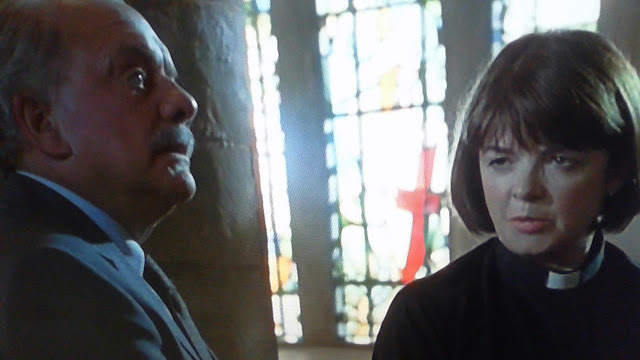I love good detective stories, whether on the screen or on the page, but my heart sinks when I realise that one of the characters is a Christian.
Christians in crime fiction seem to serve two purposes: they’re either there to be exposed as hypocrites, severe in their judgement of others yet harbouring their own nasty secrets; or they’re meant to add a certain gothic background to the themes of good and evil. The only exception seems to be bizarre period cosies, in which a priest is also a sleuth.
Other clichés abound. Notice how when the detective wants to speak to the vicar they head straight for the church, and lo, there he or she is, as though vicars spend their working life standing around in an empty building, rearranging the hymn books, or kneeling in front of the altar, asking God to stop them from killing again.
Which is why I was so impressed when I recently re-watched a 2008 episode of A Touch of Frost called Mind Games. In it the Rev Lucy Daniels is a key character. She’s courageous, human and nuanced. It’s great drama with only one clanger - Frost finds her atop a Ride On Mower still wearing her dog collar. That’s a bit annoying but we’ll let that go, grateful that, at least for one episode of one programme, we have seen a Christian positively portrayed.
Why is this so rare? TV and novel crime writers bend over backwards to represent other religions positively. If a Muslim character, say, is up to no good, you can be sure that it will clearly signalled that they are not a proper Muslim, and we will see a positive portrayal of ‘proper’ Muslim characters to make the point even clearer.
Now, I don’t object to this at all, I applaud it. But the discrepancy between the portrayal of Christians and other religions is troubling, and I wonder how much longer it can go on.
Can this discrepancy be explained? Christians in the UK are certainly not as affected by religious prejudice as Muslims, but they are not unaffected by it either. Writers assume this is still a majority Christian country yet it clearly isn’t. Christianity may be the largest religion, though not by much, but to follow any sort of religion now puts you in a tiny minority. This is a secular nation and Christians constitute a small, sometimes vulnerable section of the population, liable to be mocked, labelled or worse.
Maybe crime writers imagine they are having a go at the most privileged and secure sections of society, but this is another out of date assumption. In fact, prejudice against Christians is increasingly prone to racialization. In 1998, 12% of churchgoers were from ethnic minorities, by 2008 the figure was 17%. Another 2007 survey stated that regular churchgoing was three times higher among adults from black ethnic groups than white. My local Baptist church has experienced phenomenal growth through Iranian and Congolese Christians, fleeing from vicious persecution. Many other churches are growing thanks to South American, Asian or East European immigration. What happens to crime programmes and books when writers and casting directors wake up to this new reality?
Yes, there are some Christians who embarrass us all with their homophobia, but there are progressive voices too, and a strong LGBT Christian movement. If only we could say this about all the UK’s religions.
Why do middle class white writers think they are criticising from within the tent, even when they are atheists? They may imagine we live in an oppressively Christian society but we really don't. Perhaps some of them are transposing their own quaint, privately educated experience onto the whole of society. In reality, religious beliefs are barely explained to most state educated pupils, let alone ‘forced down their throats’. Religion is culturally alien to them.
And spare a thought for young Christians. It’s not always easy being a Christian adult, but ask yourself what it must be like to be a Christian teenager.
Our storytellers seem to know that the majority of Muslims are not terrorists, but do they yet realise that the majority of Christians are neither bigoted, privileged, nor hypocritical? Or does it just not matter? It’s time that the TV and publishing industries gave us a more realistic, and yes sympathetic, portrayal of the UK’s Christians.


Did you watch Broadchurch? I thought the vicar was a very good rounded character in that, especially in the first series.
ReplyDeleteAlso I was hoping the link to 'bizarre period cozies' would go straight to an episode of Cadfael - just so good!
Yes, Broadchurch wasn't bad, though of course the vicar did have a guilty secret. I figured out who the killer was very early, though. Bizarre period cosies may feature more in part two! I saw Cadfael once but will give it another go (and hold you responsible).
Delete